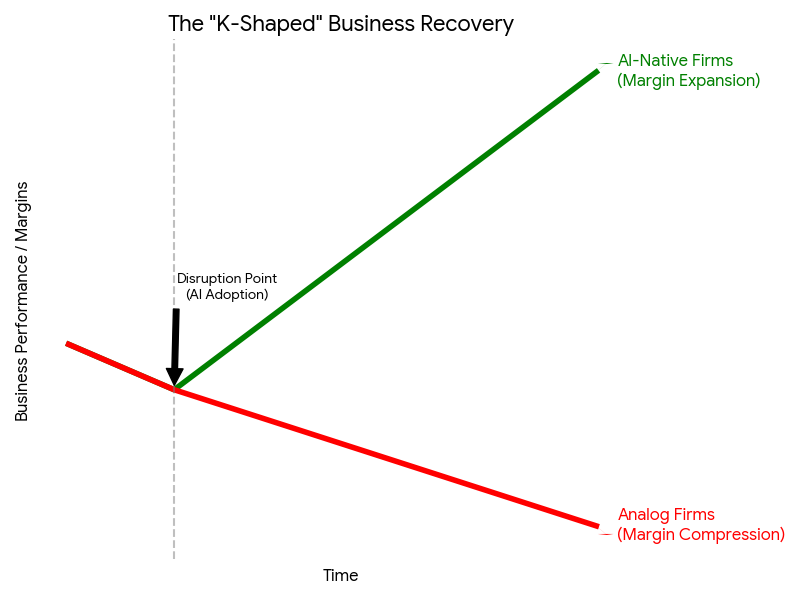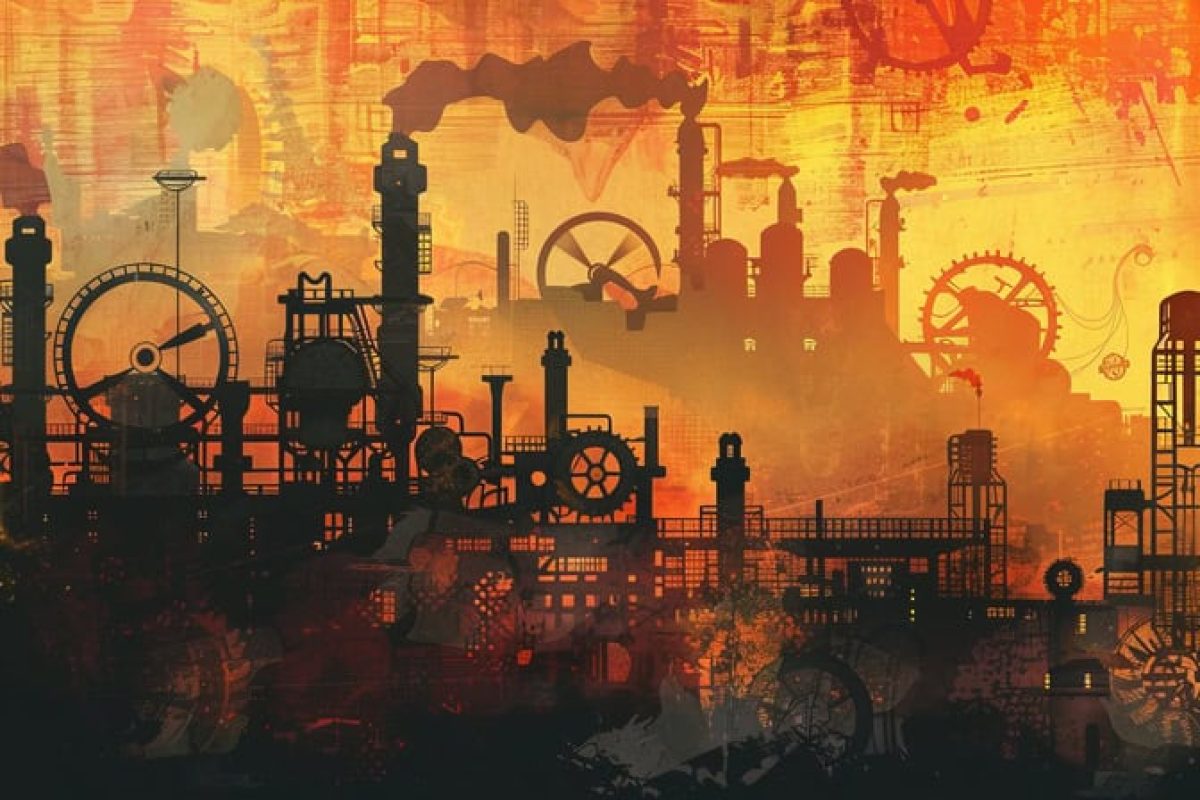History is often taught as a series of dates and inventions. But for the business leaders who lived through them, history wasn’t a timeline, it was a battlefield.
In the late 18th century, the Industrial Revolution didn’t just “arrive”. It crashed into the global economy with the force of a tsunami. It didn’t politely ask the master weavers if they were ready to retrain. It didn’t negotiate with the blacksmiths. It simply offered a brutal ultimatum: Adopt the new engine, or become the obsolete artisan.
Today, we are standing on the precipice of a shift that makes the steam engine look like a minor software update. The Artificial Intelligence Revolution is here, and it is echoing the exact same ultimatum to the Mid-Market.
For the CEO of a $100M or $500M enterprise, the danger isn’t that AI will become “Skynet” and take over the world. The danger is much more boring, and much more lethal: The danger is that a direct competitor will figure out how to offer your core service 30% cheaper and 50% faster, and they will do it while you are still “forming a committee” to study the issue.
This is not a history lesson. This is a survival guide for the next 36 months of your business.
The “Laggard’s Penalty” · The Cost of Waiting 12 Months
We often romanticize the Industrial Revolution as a time of progress. We forget the body count of businesses that failed – history is written by the winners, as they say. The companies that thrived were not necessarily the ones who invented the steam engine; they were the ones who applied it to their supply chains first.
In 2026, we are seeing the emergence of the “Laggard’s Penalty”.
In the past, technology adoption curves were gentle. If you were two years late to adopting email or the cloud, you were annoyed, but you weren’t bankrupt. AI is different. AI is exponential.
Consider two mid-sized logistics firms:
- Company A spent 2025 “watching the market”. They continue to use manual dispatchers and Excel-based routing.
- Company B implements a predictive AI routing layer.
By the end of Year 1, Company B hasn’t just saved money on fuel. Their AI has “learned” the traffic patterns of every city they operate in. It has optimized their pricing model based on real-time demand. The gap between Company A and Company B is no longer just software; it is institutional intelligence. Company B is now operating with a “synthetic brain” that Company A cannot buy off the shelf.
The Insight for the CXO: You cannot “catch up” on data accumulation. Every day you wait to implement AI is a day of data training you are handing to your competitors.
The danger isn’t that AI will become “Skynet” and take over the world. The danger is that a direct competitor will figure out how to offer your core service 30% cheaper and 50% faster.
Decentralization · The New Industrial Geography
The Industrial Revolution centralized the world. It demanded that workers leave their cottages and congregate in massive urban factories, because that’s where the power source (steam) was.
The AI Revolution is doing the exact opposite. It is the great Decentralizer.
We are moving from “Steam to Silicon,” but also from “Urban Centers to Digital Nodes”. AI tools allow your workforce to be productive not just from a home office in the suburbs, but from anywhere on the planet. This is not just a “Remote Work” trend; it is a “Talent Arbitrage” opportunity.
For the mid-market leader, this is your greatest weapon against the Fortune 500. You no longer need to compete for talent in the most expensive zip codes in San Francisco or New York. AI-enabled collaboration tools allow you to build a “best-in-class” team comprising a data scientist in Prague, a strategist in Austin, and a developer in Sao Paulo, all synchronized by an AI project management layer that never sleeps.
The Strategic Pivot: Stop trying to hire “local talent” for global problems. Use AI to coordinate a decentralized, high-efficiency workforce that costs 40% less than your bloat-heavy enterprise competitors.
The Talent Crisis · It’s Not Replacement, It’s Realignment
The headline everyone fears is: “AI will take our jobs”. The headline they should fear is: “Employees who use AI will take the jobs of employees who don’t”.
During the Industrial Revolution, the Luddites didn’t smash looms because they hated technology; they smashed them because they saw their economic value dropping to zero. We are approaching a similar friction point.
Automation will undoubtedly displace repetitive roles in data entry, basic coding, and Level 1 customer support. But just as the steam engine created the need for engineers, mechanics, and conductors, AI is creating a vacuum for new roles:
- The AI Ethics Compliance Officer
- The Prompt Engineer / Model Tuner
- The “Human-in-the-Loop” Auditor
The Leadership Challenge: You cannot fire your way to AI success. You have institutional knowledge in your people that you cannot afford to lose. The challenge for the CIO and CHRO is reskilling at scale.
You need to identify the “Artisans” in your company – the people doing manual, high-skill work – and give them the “Steam Engine”. A mid-level financial analyst armed with an AI modeling tool is suddenly as powerful as a team of five senior accountants.
The Mid-Market Advantage · Why You Can Beat the Giants
Here is the secret the tech giants don’t want you to know: They are terrified of you.
Google, Amazon, and Microsoft have the data, but they also have the “Innovator’s Dilemma”. They have massive, legacy revenue streams to protect. They have armies of lawyers slowing down every deployment. They have regulatory targets on their backs.
You do not.
As a mid-market executive, you have the “Goldilocks” advantage:
- You have data: unlike a startup, you have 10-20 years of customer history.
- You have agility: unlike a Global 2000 firm, you can pivot your strategy in a single quarter.
The winners of this era will not be the ones with the biggest R&D budgets. They will be the ones with the fastest “Time to Insight”.
If you can implement an AI customer service agent that resolves 80% of tickets instantly, while your giant competitor is still stuck in a 6-month compliance review, you win the customer experience battle. Speed is the new scale.
The Inequality of ROI
We must be honest about the economics. The Industrial Revolution created massive wealth inequality. Factory owners bought estates; factory workers lived in tenements.
AI threatens to do the same, but at a corporate level. We are seeing a “K-Shaped” recovery in business performance:
- The Upper K (The AI-Native): Companies that integrate AI into their P&L see margin expansion, lower COGS (Cost of Goods Sold), and higher revenue per employee.
- The Lower K (The Analog): Companies that ignore AI see their margins squeezed by inflation and labor costs, unable to compete on price.

The Warning: If your strategic plan for 2026 assumes “business as usual” with a standard 3% growth target, you are already in the Lower K. You need to be looking for 10x efficiencies, not 10% improvements.
The Regulatory Moat is Filling
Just as the 19th century eventually brought child labor laws and safety standards, the AI Wild West is about to get a Sheriff.
Privacy laws, algorithmic bias audits, and “Right to Explanation” legislation are coming. The EU is leading the charge, but the US will follow.
Many mid-market CEOs view this as a headache. The smart ones view it as a Moat. If you build your AI infrastructure now with governance, security, and ethics at the core, you are future-proofing your business. When the regulations hit, your competitors will be forced to pause and rebuild their systems. You will be compliant by design.
The Role of the CIO: Your CIO is no longer just the “Keeper of the Servers”. They are now your Chief Risk Officer. They need to ensure that your proprietary data isn’t being fed into a public model (like ChatGPT) where it can leak to competitors.
The “Boardroom Slide” · Your Immediate Action Plan
You may be reading this and wondering, “Okay, I get it. But what do I do on Monday morning?”
Do not let your next strategy meeting be a generic discussion. Walk into the boardroom with these three specific questions. They will clarify who is serious about the future and who is clinging to the past.
### The 3 Questions That Will Define Your Year:
1. Where is our “Hand-Loom”?
- The Audit: Which department is currently burning cash on manual, repetitive cognitive tasks? Is it Claims Processing? Accounts Payable? Paralegal research?
- The Goal: Identify one pilot project where AI can reduce manual effort by 50% in 90 days.
2. Are we the Luddites?
- The Mirror: Is your IT department resisting AI because of legitimate security concerns, or because they lack the skill set to manage it?
- The Fix: If it’s a skill gap, you need a partner, not a new hire. You need external expertise to bridge the gap while your team catches up.
3. What is our “Steam Engine” Budget?
- The Investment: Show me the line item for AI innovation. If it is $0, or if it is buried inside “General IT Maintenance,” we have already decided to lose.
- The Reality Check: You cannot buy a Ferrari with spare change. AI requires a dedicated, protected budget for experimentation.
Your Ultimate Choice · Will You Be an Architect or Artifact?
The Industrial Revolution left behind two types of businesses: the Architects who built the new world, and the Artifacts that were left in museums.
You are currently writing the history of your company. The market is waiting to see which one you will be.
Most mid-market companies try to navigate this transition alone. They hand the “AI Project” to an overburdened IT Director who is already busy fighting off ransomware and fixing ERP bugs. The result is almost always a stalled pilot, a “toy” implementation, or a security leak.
This is why Innovation Vista was created.
We do not offer generic advice. We act as your Interim Chief Strategy Officer for Tech & Innovation.
- We help you identify the “Steam Engine” that fits your specific P&L.
- We map the reskilling of your workforce so you don’t lose your artisans.
- We build the governance framework that keeps you safe while you run fast.
The storm is not coming; it is already here. This article can serve as a kind of map. Now you need the navigator. Secure Your Steam Engine – Book a Briefing Call.




